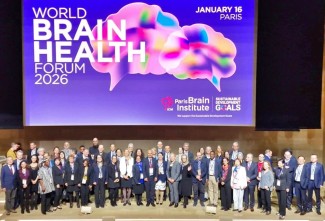Léonie KOBAN and Hilke PLASMANN, researchers in the team "CIA: cognitive control - interoception - attention", have identified a novel brain marker using functional imaging that predicts our preference for immediate rewards over larger later rewards. This work is published in the Journal of Neuroscience.
Delay discounting (DD)
Delay discounting (DD) is a cognitive process that describes to what degree individuals are willing to wait for larger monetary pay-off that they receive in the future or whether they prefer to receive a smaller one now (e.g., 1 EUR now vs. 2 EUR in a week). The more people discount time, the more they to prefer to receive an immediate reward rather than wait for a larger reward that is only available in the future. We are all regularly faced with this type of choice: for instance, when we decide to buy some new shoes today or save to the money for a nice vacation in the summer, whether we eat a snack in the afternoon or save our appetite for dinner, and whether we go out with friends in the evening or go to bed early to be rested the next day.
DD is highly variable from one person to the next but remains stable over time for the same person. Previous studies have associated DD as a risk factor in eating disorders (obesity or anorexia), smoking, alcohol use disorder, or drug addiction.
The aim of the study conducted by the Institute's researchers was to identify a replicable machine-learning based brain marker predictive of DD and to validate it in an independent population.
Assessing trends in choices
To this end, 255 healthy volunteers were asked to make choices between smaller immediate and larger later rewards during a functional MRI scan. The researchers also measured the body weight and height, the percentage of fat mass, blood insulin, and glucose levels of the study participants.
Significant results: the brain signature of DD
The researchers from the ICM and their colleagues used a machine learning algorithm to detect a pattern of functional brain activity that could predict individual differences in delay discounting. Machine learning is a form of artificial intelligence that allows a mathematical and statistical model to predict new data based on previously analyzed data.
The results of the study showed that it was possible to predict a person’s degree of delay discounting based on their functional brain activity across different brain regions. Furthermore, the researchers found that the marker was related to individual differences in blood insulin and glucose—two metabolic markers—and that it differed between overweight and normal weight individuals.
Future studies can test this marker in disorders characterized by impaired decision making, such as eating disorders, addictions, or neurodegenerative diseases like Alzheimer's or Parkinson's.
Sources
Koban L, Lee S, Schelski DS, Simon MC, Lerman C, Weber B, Kable JW, Plassmann H. An fMRI-based brain marker of individual differences in delay discounting. J Neurosci. 2023 Jan 18:JN-RM-1343-22. doi: 10.1523/JNEUROSCI.1343-22.2022. Epub ahead of print. PMID: 36657973.







